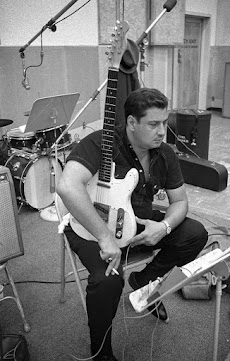We turn from the then-current instrumental "Jingle Bells" of the Ventures to a few instrumental versions in the old school Honky Tonk style of piano!
Wednesday, September 29, 2021
"Jingle Bells" - Part 52 - Honky Tonk!
We turn from the then-current instrumental "Jingle Bells" of the Ventures to a few instrumental versions in the old school Honky Tonk style of piano!
Monday, September 27, 2021
"Jingle Bells" - Part 51 - Venturing Forth!
We inch up to 1965 for this version of "Jingle Bells" from "The Venture's Christmas Album" on Dolton Records:
Saturday, September 25, 2021
"Jingle Bells" - Part 50 - Going to the Dogs!
For our fiftieth "Jingle Bells" post, we turn to perhaps the most famous version of all: the Singing Dogs!
Thursday, September 23, 2021
"Jingle Bells" - Part 49 - A Little More Ozzie!
We time-hop back to 1946 for this version of "Jingle Bells" recorded under the title of "Jingling the Bells" by pianist Frank Signorelli's Quintet on Davis Records:
 |
| The Original Memphis Five including Phil Napoleon on trumpet and Frank Signorelli on piano. |
Tuesday, September 21, 2021
"Jingle Bells" - Part 48 - Full Nelson!
We left "Jingle Bells" in the capable hands of Ricky Nelson and now we take a look at an episode of his family's TV show that incorporates not on "Jingle Bells" but also "A Christmas Carol!"
Sunday, September 19, 2021
"Jingle Bells" - Part 47 - Ricky!
Ricky recorded this in 1960, but it didn't receive an official release until 2000 when it appeared on the "Legacy" box set.
I'm really glad that Ozzie and Will Wright do not talk over James Burton's guitar solo, but when they do talk, it's over a piano chorus that's not included on the audio track as released. Hmmm...I also notice that when the audience joins in for the final chorus, they yell "Hey!" although Ricky does not!And there are too many reaction shots of "Wally Plumstead" in there!
Friday, September 17, 2021
"Jingle Bells" - Part 46 - Alviiinnnn!
We move from Disney's All-Mouse Chorus to another group of singing varmints - The Chipmunks!
 |
| Note the early "realistic" chipmunk designs! |
 |
| Gotta love how the back of the EP sleeve shows the back of the witch doctor! |
Wednesday, September 15, 2021
"Jingle Bells" - Part 45 - Disney Novelties!
Hanging around the late 1950s with "Jingle Bells," we come across a couple of novelty versions issued by the relatively new Disneyland Records.
Monday, September 13, 2021
"Jingle Bells" - Part 44 - Warner Brothers!
We left "Jingle Bells" with a wacky stereo arrangement from the Three Suns in 1959, so we hang around that year with a couple of instrumentals recorded for the new Warner Bros. label!
 |
| Tommy Tedesco in the studio. |
Saturday, September 11, 2021
"Jingle Bells" - Part 43 - One for Each Sun!
We jump back around a bit to listen to three different versions of "Jingle Bells" (all recorded for RCA Victor) by the popular instrumental group the Three Suns!
First is this version from 1949 from the "Your Christmas Favorites" album:
That's the original sound of the group, with basically just Al Nevins on guitar, his brother Morty Nevins on accordion and their cousin Artie Dunn on electric organ (Artie also sang on some numbers).
They cut another holiday album in 1955, this one titled "The Sounds of Christmas," with a totally different arrangement of "Jingle Bells":
This strays from the group's original sound as it features "string orchestra" accompaniment. What's intriguing is that the orchestra is led by Marty Gold, our fiend from the Korn Kobblers!
We jump ahead a few more years to 1959 with another album, this with the catchy title of "A Ding Dong Dandy Christmas" and another very different arrangement of the song in question:
That's the sound that modern listeners want to hear from the Three Suns, the space-age pop with early stereo effects.
By this point Al Nevins was doing a lot of production work and most likely wasn't responsible for the extremely 1959-sounding guitar work! Who knows, maybe they were all ringers by then!
It's interesting to see the evolution in style over the ten years and three versions of "Jingle Bells!"
Before we go, let's listen to the Three Suns' theme song "Twilight Time," as originally recorded in 1944 for the independent Hit label:
Everyone knows the later vocal version by the Platters from 1958 - and that's a great record to be sure, but I really like the original!
Popular (For Some Reason) Posts:
-
I do watch a lot baseball movies and other old movies, but I do occasionally view something newer! As a case in point, I watched the new mov...
-
Hello and welcome to Wheezer's Warehouse! My name's Johnny and I have something of an obsession with retro pop culture. Old music, m...
-
I feel like we need another baseball song as well as more Jerry Colonna, so from the Two Birds Department, here's Jerry's 1946 recor...

















































